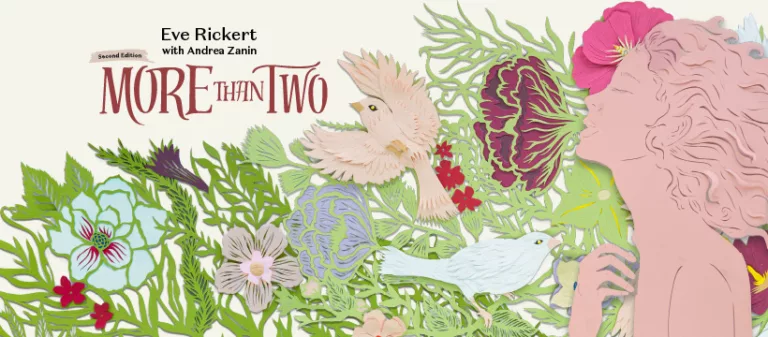Abuse is, unfortunately, common in polyamorous relationships, just as in monogamous relationships. Polyamorous abuse can look different from abuse in monogamous relationships because of the characteristics of group dynamics. In addition, most polyamorous relationship advice assumes non-abusive relationships, but may be harmful when applied to abusive situations, and many resources for abuse survivors aren’t necessarily friendly for polyamorous people.
Several of the resources below contain checklists of behaviours common to abusive relationships and to healthy relationships; however, the following are some possible signs of abusive polyamorous situations, specifically*:
- You feel frequently demeaned or humiliated by a partner or metamour.
- You feel that acceptance by your polycule depends on your participation in group sex.
- A partner or metamour reads your messages, emails, journals or other private information without your permission.
- You find yourself doubting your own grip on reality, especially as it pertains to a relationship or your polycule.
- You feel like a partner or metamour is “two different people,” or like you never know whether a partner or metamour will hurt you or support you in any given moment.
- You feel discouraged from communicating with your metamours.
- You feel you are expected to keep secrets from or about your partners or metamours.
- You only or primarily hear negative things about your metamours.
- The things a partner says and the things your metamours say often don’t seem to match up.
- You’re made to feel that you are “not really polyamorous” if you express a concern, ask for a limit, or communicate your feelings.
- You feel shamed for seeking out social supports outside your polycule.
- A partner or metamour invalidates your feelings or internal experience.
- A partner or metamour claims to be a gatekeeper, or the only or best source of reliable information about polyamory.
- You feel that no one else will want to be with you or “put up with you” if you leave.
- You feel like the sole problem in a relationship or polycule.
Resources and reading
The following are some resources that you may find useful to help you decide whether your situation may be abusive, help others, or heal from abuse:
- The Network/La Red is a survivor-led, queer- and poly-friendly organization for ending partner abuse, and they have a hotline (617-742-4911).
- Love Is Respect is an educational and resource site about abuse. It includes pages for survivors and perpetrators of abuse, as well as information on helping friends or family members who are experiencing (or committing) abuse. They also have a hotline (call 866-331-9474 or text LOVEIS to 22522).
- Couples counselling is not recommended in abusive situations. Here’s why. However, members of the Gottman Institute argue that couples counselling may be helpful in some situations where people are using abusive behaviours that aren’t part of patterned “characterological” abuse.
- And here’s a good resource guide for men in abusive relationships.
- This article debunks the claim that women abuse about as often as men do, or that two people can “abuse each other.” Here is another good piece on the myth of “mutual abuse.”
- If you think you are or might be abusing a partner, this page from the National Domestic Violence Hotline can help you find resources to stop.
- The acronym DARVO stands for “Deny, Attack, and Reverse Victim and Offender,” and is a common tactic of people who are committing abuse. Read more about it here.
- A useful essay on red flags for “toxic polyamory culture.”
- Mo Daviau’s narcissistic abuse resource list.
- The podcasts Believed, about Larry Nassar and his enablers; Uncovered, about NXIVM; and IndoctriNation, on cults generally (especially Scientology), are all excellent resources to learn about abusive group dynamics and tactics used by charismatic “leaders” and the people who enable them. Similar patterns play out in many polycules and polyamorous communities.
- Here’s a long, comprehensive essay on confronting abuse in polyamorous relationships, including detailed and useful discussions on tricky issues like metamour abuse and when an abuser is claiming to be a victim.
- Poly Weekly episode on emotional abuse, featuring Shannon Perez-Darby of the Northwest Network of Bisexual, Trans, Lesbian & Gay Survivors of Abuse.
- Alicia Bunyan-Sampson did a presentation on abuse in polyamorous relationships at PolyDallas Millennium 2020, and posted some of the highlights to her Instagram.
- The Relationship Bill of Rights from the book More Than Two is now available as a poster.
- Here are some statistics and information on abuse in LGBT relationships.
- To learn more about how to help victims, Restorative Justice Victoria (BC) offers a free four-hour online training in Victim Services and Restorative Justice. To dig deeper, check out the Creative Interventions Toolkit or Simon Fraser University’s (Canada) online certificate in restorative justice, or look into volunteering at your local rape crisis centre, where you will receive extensive training in victim support.
- I strongly advise against seeking transformative justice or a community accountability process in cases of relationship abuse, and I recommend the work of Estelle Ellison and Lee Shevek on the cooptation and misuse of these concepts to protect abusers.
Here are some books:
- Why Does He Do That?: Inside the Minds of Angry and Controlling Men by Lundy Bancroft—hands-down the single best resource available for understanding abusive men and patterns of misogynistic abuse. (Powell’s | Indiebound | Amazon)
- The Gaslight Effect: How to Spot and Survive the Hidden Manipulation Others Use to Control Your Life by Robin Stern. This is the book that originally popularized the term “gaslighting.” (Powell’s | Indiebound | Amazon)
- Terror, Love and Brainwashing: Attachment in Cults and Totalitarian Systems by Alexandra Stein is great for understanding the kind of abuse that can happen in abusive polyamorous networks. (Powell’s | Indiebound |Amazon)
- The Gift of Fear and Other Survival Signals that Protect Us From Violence by Gavin de Becker. (Powell’s | Indiebound | Amazon)
- The Body Keeps the Score: Brain, Mind, and Body in the Healing of Trauma by Bessel van der Kolk. (Powell’s | Indiebound | Amazon)
- The Verbally Abusive Man – Can He Change? A Woman’s Guide to Deciding Whether to Stay or Go by Patricia Evans. (Powell’s | Indiebound | Amazon)
- Emotional Blackmail: When the People in Your Life Use Fear, Obligation, and Guilt to Manipulate You by Susan Forward. (Powell’s | Indiebound | Amazon)
- Controlling People: How to Recognize, Understand, and Deal with People Who Try to Control You by Patricia Evans. (Powell’s | Indiebound | Amazon)
- Goodbye, Sweet Girl: A Story of Domestic Violence and Survival by Kelly Sundberg is a heart-rending memoir of surviving and leaving an abusive relationship. (Powell’s | Indiebound | Amazon)
First-person accounts
Enough people have come forward describing their own experiences of abuse in polyamorous relationships that there’s now enough for a whole section on first-person accounts.
- “Abuse in Polyamorous Relationships” by Shea Emma Fett (2014). She also wrote an excellent essay about gaslighting, and has allowed me to republish some of her older blog posts as guest posts on this blog.
- “The Polypath” and “Polypath Aftermath” by Mo Daviau (2014/15).
- “I was in a polyamorous and abusive relationship for 7 years… here’s what I learned” by Inês Rôlo (2019), and a follow-up piece, “You don’t have to own your feelings.”
- A woman going by Maggie Haukka has chronicled her escape from a (monogamous) abusive relationship on Medium, and her posts provide lots of important information about safety planning.
If you need immediate help, assistance with safety or exit planning, or just need to talk to someone, you can call the Network/La Red hotline at (617) 742-4911, or the National Abuse Hotline at (800) 799-7233.
*Thanks to Samantha Manewitz, LICSW, for assistance with this list of red flags.


